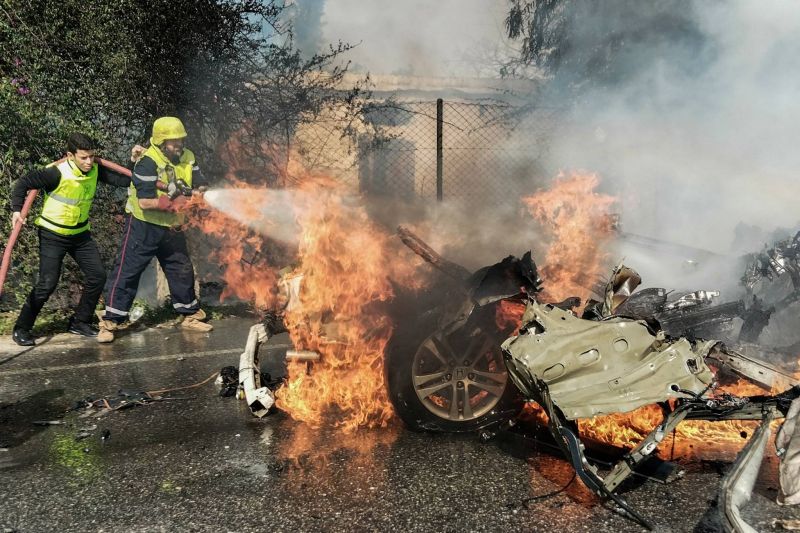
Firefighters douse a burning car after it was hit in an Israeli strike in Lebanon's southern area of Tyre on March 13, 2024, amid ongoing cross-border tensions as fighting continues between Israel and Palestinian Hamas militants in the Gaza Strip. (Credit: AFP)
Want to get the Morning Brief by email? Click here to sign up.
Catch up on yesterday’s LIVE coverage of Day 158 of the Gaza war here.
Israeli attacks killed a Hamas official and a bystander in Sour and later the same day seriously injured a seven-year-old child in Yater. An Israeli drone strike near the Rashidieh Palestinian camp struck a car driving along Sour’s main road killing Hamas official Hadi Mustafa and a passing motorcyclist, while leaving a third person in critical condition. Israel previously assassinated two Hamas officials in Lebanon, one of whom, the group’s deputy political leader Saleh al-Arouri, was killed in a drone strike on Beirut’s southern suburbs An Israeli airstrike on a building in Yater later the same day seriously injured a child and slightly wounded two other people.
“This year, Ramadan will be marked by Gaza, its people and the support fronts in Lebanon, Yemen and Iraq. These support fronts will be present during this blessed month, and they must be strong,” Hezbollah Secretary-General Hassan Nasrallah said yesterday, as the party continued its cross-border strikes on Israel. Nasrallah dedicated most of his speech to the start of Ramadan and religious issues, saying that discussion about the “support front” in southern Lebanon would have to wait for another speech during the holy month.
A UN peacekeeper (UNIFIL) investigation found that “there was no exchange of fire across the Blue Line” when an Israeli tank round killed Reuters video journalist Issam Aballah on Oct. 13, 2023, adding that he had been part of a group of “clearly identifiable journalists.” UNIFIL’s investigation corroborated earlier findings on the strike which blamed Israel for the attack that killed Abdallah and six others. Last month, more than 120 individuals and groups called for a UN probe into Israeli attacks on journalists in south Lebanon. Last November, Al Mayadeen said its journalists Farah Omar and Rabih Maamari were killed by Israeli strikes while working in southern Lebanon.
Beirut Governor Marwan Abboud issued regulations forcing displaced Syrians to register their residency and vehicle papers with the municipality, prohibiting them from freelance work without a municipal license and demanding data from their lessors and employers. Beirut MP Wadah Sadek, expressing support for the decision, shifted the focus on “the Interior Ministry and the Internal Security Forces who are directly responsible for implementing the decision of the governor and punishing those who violate” Abboud’s orders. The new regulations demand that employers issue displaced Syrians with documents certifying the relationship — emphasizing the directives’ application to “delivery workers.” Lessors, meanwhile, have been asked to refrain from concluding contracts with displaced Syrian tenants before obtaining municipality approval. Last year, Lebanese authorities issued a series of restrictions targeting displaced Syrians, including demands for their registration with local authorities along with restrictions on labor and access to rental contracts. The government also undertook mass deportations, drawing concern from rights organizations considering Syria unsafe for return.
Beirut Port Director Omar Itani unveiled the details of a French plan to renovate the facility, announcing unprecedented revenues and container processing rates since the tragic Aug. 4, 2020 blast. Itani said nearly 900 ships passed through the port last year and 800,000 containers were processed in 2023, 300,000 more than the year before, achieving a revenue of almost $150 million. The plan devised with French engineering firms EGIS and Artelia includes a new organization of traffic inside and around the port, the renovation of Quay 9, and allocation space for solar panel installation — estimated by French state electricity company EDF to require 50,000 square meters.
At least 31,272 people have been killed in Gaza since Oct. 7, according to the latest figures from the enclave’s health ministry. Hamas envoys returned to Cairo to resume negotiations attempting to usher in a cease-fire after weeks of failed attempts to reconcile the group’s demand for a total cease-fire with Israel’s insistence on an immediate hostage release. Israeli Prime Minister Benjamin Netanyahu restated his objective of eradicating Hamas, which he claimed necessitates the Israeli army’s expansion into Rafah — against which international actors have repeatedly warned, citing the risk to the more than one million civilians displaced to Gaza’s southernmost city. The Israeli army has already shelled Rafah several times, killing dozens of civilians, and yesterday hit a warehouse used by the UN agency for Palestinian refugees (UNRWA), causing several injuries and deaths, by the agency’s and Gazan Health Ministry’s estimates. The same day, 68 orphaned children were transported from Rafah to the West Bank, in what the Tel Aviv German Embassy called a “temporary measure.” A second ship destined for Gaza through the tentative Cypriot maritime aid corridor set sail yesterday, while Palestinian and international actors have warned that the quantities transported are meager compared to the enclave’s needs, as famine looms nearly inevitable. Amnesty International head Agnes Callamard said it was a sign of the international community’s weakness to attempt seafaring aid for Gaza, an inexpensive and inefficient workaround to Israeli regulations and difficulties to transport amid the war, while it continues to transfer arms to Israel.
In case you missed it, here’s our must-read story from yesterday: “ISF’s recent recruitment campaign”
Compiled by Abbas Mahfouz